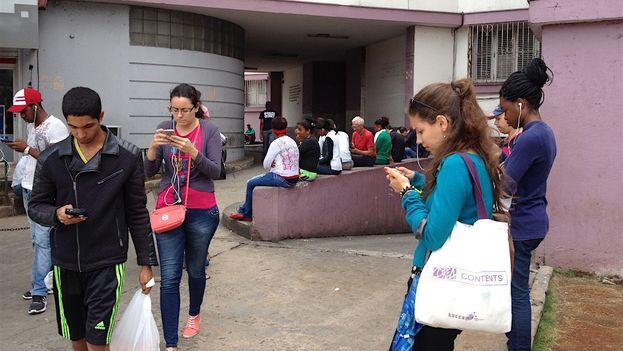
![]() EFE/14ymedio, Havana, 7 December 2022 — The Cuban state telecommunications company Etecsa announced on Wednesday an agreement with the French company Orange to build an underwater cable between Cuba and Martinique to improve internet access on the Island.
EFE/14ymedio, Havana, 7 December 2022 — The Cuban state telecommunications company Etecsa announced on Wednesday an agreement with the French company Orange to build an underwater cable between Cuba and Martinique to improve internet access on the Island.
The announcement came just a week after experts from the U.S. Department of Justice advised against installing what would have been the first submarine telecommunications cable to connect the Island to U.S. territory.
Etecsa explained in a statement that it has signed an agreement that will allow it to “expand and diversify international capacities, given the growing demand for internet connection and broadband services” and “support its international expansion.”
“It will allow, in accordance with the country’s economic possibilities, to continue expanding international connectivity,” the company said.
This connection “will provide the country with a new route for international services, geographically diversifying current connectivity.” Cuba has only one submarine cable for the internet, the ALBA-1, which has been connecting it to Venezuela since 2012.
It added that Orange will deploy the submarine cable through its subsidiary Orange Marine, to connect the province of Cienfuegos with the island of Martinique, a French overseas territory almost 1,200 miles away.
Etecsa did not announce deadlines or the cost of the plan. It only indicated that the project is “under development,” that it has “all permissions for deployment” and that “the physical structure” of the cable will be ready in 2023.
The week before, the U.S. Federal Communications Commission recommended not granting an underwater cable license to the ARCOS-1 USA system to connect Florida to the Island.
The U.S. Department of Justice stated that the Cuban government represents a “counter-intelligence threat” to the United States because Etecsa would manage the cable landing system, and then Havana could “access sensitive U.S. data traveling through the new segment of the cable.”
The Cuban government criticized this decision and said that it causes “harm to the Cuban people.”
On the other hand, the Cuban Minister of Foreign Affairs, Bruno Rodríguez, on Wednesday, “strongly” denounced a cyberattack on the website of the Ministry of Foreign Affairs that occurred yesterday.
The Ministry of Foreign Affairs reported on Twitter that its internet portal “had limited access to users for several hours from 11:00 a.m. on Tuesday.”
The cause, according to the Chancellery, was “a cyberattack that was intended to intentionally saturate bandwidth on the network.”
Rodríguez said that “illegal actions by cyberpirates are part of the unconventional war against Cuba in (the) communication and digital spheres.” The Foreign Ministry’s statement also pointed to the “communication war” against the Island, without offering more details.
The Foreign Relations complaint happened just two weeks before the Government held its “National Cybersecurity Day, whose “objective is to raise awareness and propose concrete actions in the technological field.”
“A computerized society, increasingly present in cyberspace, requires and defends its security,” said the Ministry of Communications, which used the hashtag #CybersecurityForAll in several publications.
Translated by Regina Anavy
____________
COLLABORATE WITH OUR WORK: The 14ymedio team is committed to practicing serious journalism that reflects Cuba’s reality in all its depth. Thank you for joining us on this long journey. We invite you to continue supporting us by becoming a member of 14ymedio now. Together we can continue transforming journalism in Cuba.
